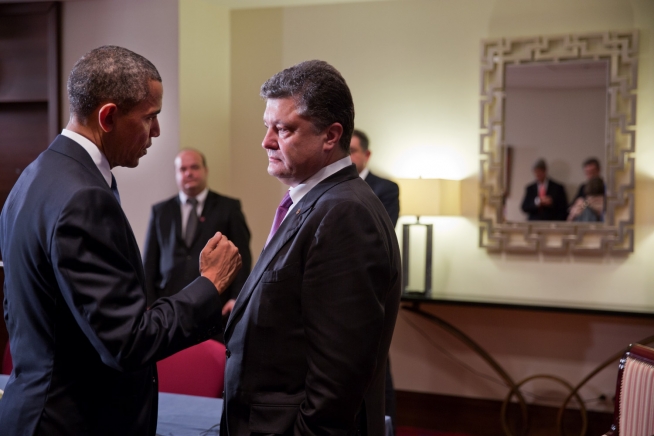
Damon Wilson: White House May Have to Decide to Act Without European Union
The United States has only a dwindling few days left to persuade the European Union to join it in imposing broad economic sanctions against Russia for its attacks on Ukraine. After the EU Council meets on Wednesday, July 16, the Obama administration may well have to decide how far it would like to go in taking such steps without a united Western world behind it.
“It’s clear that the US government is making an all-out push” to persuade EU member states to escalate sanctions on Russia, Atlantic Council Executive Vice President Damon Wilson said today. Western governments so far have banned business transactions or travel in the West by individuals associated with President Vladimir Putin or his government’s attacks on Ukraine, and for some companies or banks associated with them.
Now the US is pressing for sanctions that would target entire sectors of the Russian economy, “but it is far from clear that the EU will come to any consensus to act,” Wilson said “France and Italy are among the most reluctant, along with others like Austria, Hungary and Greece. And while Germany seems to be pushing for a stronger EU line, the continuing saga of American spying on Germany is severely complicating strong US-German cooperation and leadership.”
Will the White House Act Alone?
“Thus, the key issue coming to President Obama is whether the United States is prepared to impose more serious sanctions against Russia without Europe,” Wilson said. “It’s not clear at all where the White House will come out. In the absence of the EU, I would still hope that the other G7 nations of Canada and Japan would join the US in acting to keep the G7 pledge to impose further sanctions on Russia if it fails to cease its support of separatists [fighting Ukraine’s government], which is clearly the case.”
In Congress, both Democratic and Republican senators grilled assistant secretaries of state, defense and treasury, over the Obama administration’s failure to impose the broader sanctions over the Kremlin’s backing of separatist militias fighting a three-month-old war to take over southeastern Ukraine. “What are we waiting for?” asked Sen. Bob Menendez, the New Jersey Democrat who chairs the Senate Foreign Relations Committee. He suggested that Congress may choose to act on its own. Sen. Bob Corker of Tennessee, the committee’s senior Republican, said a “feckless” policy has left the US looking like a “paper tiger.”
Former US national security advisor Stephen Hadley (who is a board member of the Atlantic Council) agreed in testimony to the committee that “the United States and its allies have threatened more sanctions then they have delivered, undercutting the credibility of this element of strategy.” But, he said, “Sanctions are only part of a strategy not the sum total of it.” He called for other steps by the US and the transatlantic community to better deter Russian President Vladimir Putin from continuing his effort to dominate Russia’s neighboring states of the former Soviet Union.
Wilson: Putin’s Divisive Strategy is Working
As the US makes its final push in the next few days for a stronger European position, it confronts the uncomfortable reality that Moscow’s effort to divide the West are having significant success, said Wilson: “If you step back at take a look at the politics swirling around the sanctions debate, it’s unfortunate that it is playing out just as Putin planned. The Kremlin is using its leverage (economic, energy and political) within Europe to prevent a firm EU consensus from forming, while masterfully timing the release of intelligence leaks to ensure the allies spend more time bickering among themselves than concentrating on the real threat to their interests. There’s a good chance the recent leak seeking to discredit Polish FM Sikorski and Polish-US ties and the most recent spy scandals between the US and Germany trace their fingerprints back to Snowden-Moscow. This doesn’t absolve the US for poor judgment regarding Germany, but we need to be careful not to let Russia’s strategy of sowing discord among the allies allow Putin to get away with bald aggression against Ukraine.”
James Rupert is an editor at the Atlantic Council
Image: President Barack Obama meets Ukraine’s President-elect Petro Poroshenko in Warsaw, June 4, 2014. The US administration has assured Ukraine it will use sanctions to help defend it against Russia’s proxy war in the southeastern Ukrainian region of Donbas. (White House/Pete Souza)
